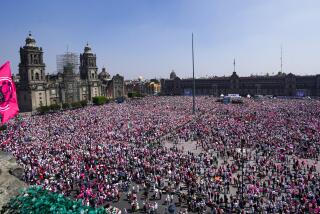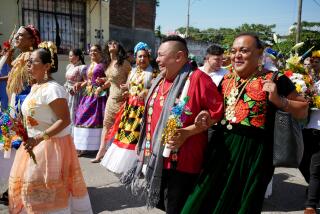POLITICS : Fearing Worker Unrest, Unions Cancel Parade : Mexico’s Labor Day march has traditionally been pro-government. But anger over economic crisis threatened to turn annual rite into a ‘violent situation.’
MEXICO CITY — Despite Mexico’s soaring interest rates, its sharply devalued peso and harsh government limits on wage increases, it isn’t going to rain on Mexico’s Labor Day parade this year.
It was canceled.
For the first time in the modern history of a nation where organized labor has ruled supreme, the leaders of Mexico’s largest unions announced this week that there will be no official parade on May 1, the day most of the world celebrates Labor Day with millions of workers taking to the streets.
The pressures of the nation’s deep economic crisis and the despair it has spawned throughout Mexico’s working class could have transformed the mass turnout into “a grave and violent situation,” said the venerable 94-year-old labor leader Fidel Velazquez, adding that a parade would have even exacted a price on the unions themselves.
Like most of the country, they are almost broke, he said.
But the canceled parade--an annual event here that is traditionally as pro-government as it is pro-labor--is an apt metaphor for Mexico’s organized labor movement as a whole.
Born with the Mexican Revolution and built into one of the key pillars of support beneath the Institutional Revolutionary Party, or PRI, that has ruled the nation since 1929, Mexico’s labor movement is beginning to crack at the seams, along with the ruling party itself.
Under the strain of Mexico’s worst economic crisis in modern history, those cracks have already surfaced publicly in the once-monolithic structure of unions in Velazquez’s Confederation of Mexican Workers. The confederation is the biggest member of the Labor Congress, an umbrella institution that has traditionally delivered the PRI nearly 10 million votes nationwide on Election Day.
Several key labor groups, principally the teachers union, have asserted increasing autonomy this year, criticizing the government and PRI openly for the first time. And labor’s decision on Monday to cancel the parade has become more fodder for the growing dissent.
*
One large union in the Labor Congress suggested that it may march anyway. Joel Lopez Mayren, secretary general of the Revolutionary Workers Confederation, charged that the parade’s cancellation will help seal the fate of organized labor by opening the way for independent and leftist labor groups to seize the streets--and the day--on May 1.
Other labor leaders privately said that they also disagreed, stressing that the parade would be an important opportunity to allow millions of workers crushed between skyrocketing prices and government-enforced limits of 10% wage increases to vent their anger and despair.
But Velazquez has stood firm, refusing to give Big Labor’s blessing to an event that, after decades of serving as a show of pro-government force, could well become a demonstration of anti-government rage.
At a Labor Congress assembly Monday, all but two of the 34 labor confederations in attendance voted in favor of Velasquez’s decision.
Critics of the decision insist, however, that organized labor will pay a greater price for canceling the parade.
The controversy comes against a backdrop of spiraling inflation that Zedillo’s government acknowledges will be at least 42% this year.
Some analysts speculate that, with its future so much at stake, organized labor may yet change its mind about the parade. They say independent labor groups have already announced that they intend to spend April planning for what one independent labor leader called “a massive mobilization in the capital’s main square on May 1 to repudiate the plan of the present regime.”
(BEGIN TEXT OF INFOBOX / INFOGRAPHIC)
Mexico’s Organized Labor
The Labor Congress, an umbrella federation of 38 subsidiaries, makes up the labor sector of Mexico’s ruling Institutional Revolutionary Party. About 10 million workers belong to the congress.
Some Key Members
Confederation of Mexican Workers: More than 6 million members from 140 smaller unions representing about 82,000 companies. One key bloc is the Federation of Goods and Services Companies Unions, which has nine unions, including telephone workers, pilots, electricians and actors.
Federation of Government Workers Unions: 88 federal government employees unions, representing about 1.6 million workers. Among them is the largest single union in Latin America, the National Education Workers Union, with 1.2 million members.
Revolutionary Confederation of Workers and Farmers: 1.5 million members.
Regional Confederation of Mexican Workers: 500,000 members.
National Mining and Metalworkers Union: 250,000 workers.
Petroleum Workers Union: 60,000 workers.
Railroad Workers Union: 60,000 workers.
Source: Times Mexico City Bureau
More to Read
Sign up for Essential California
The most important California stories and recommendations in your inbox every morning.
You may occasionally receive promotional content from the Los Angeles Times.










